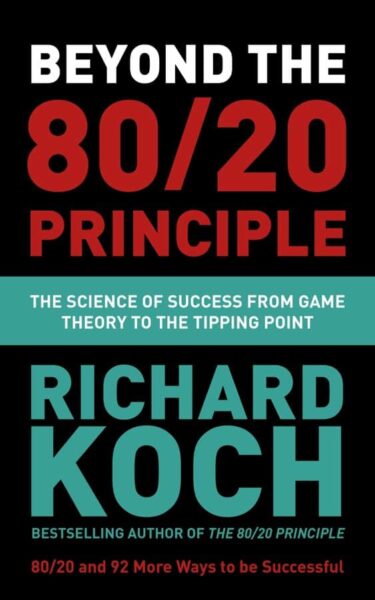The latest book I recently finished up is Beyond The 80/20 Principle by Richard Koch. My first impression by the book was a bit of confusion and having to try to find how it flowed. Even when I picked up the sample and started reading I wasn’t sure about the book. I went ahead and read it anyway. It wasn’t until about half way through that I found any sort of flow in the book or how it fit together with business.
I’m not sure if it’s because I’m just not smart enough to comprehend the author’s message or if he’s just well beyond his ability to explain things, but I was lost for a good chunk of the book. I think the hardest for me to connect with were part one (the biological laws) and part two (the physical laws). While I realize there may be some loose connections with businesses, I also believe you could find a connection between anything and anything else.
So, what does that mean for the book? I think it means as a whole that it was lacking in lessons and actual usefulness for a business. There were some good parts that I did note as I was reading, though.
Some Parts I Liked
Some of the quotes I think were useful and accurate (in almost anything in life, though) were:
Diversity works.
It always leads to even greater diversity, and to sustainable growth.
Beyond the 80/20 Principle by Richard Koch
Diversity does work and keeping things diverse rather than homogenous is always a good thing. It can only lead to good things if people are open to it and treat diverse ideas and people well.
There’s always a lot of discussion in business that success comes from niching down. I tend to agree but that’s also very challenging. This quote I think speaks to that need for business very well.
Extend the distance between yourself and your closest rival, until it is clear that there really isn’t a closest rival. Then you’ve arrived at the happy country: Uniqueland.
Beyond the 80/20 Principle by Richard Koch
In other words, find your niche that is separate from the competition and then pretty soon you have no competition. This is true and something to strive for in business but at the same time it’s extremely difficult. Or at least I think it’s extremely difficult.
There are several parts where Richard Koch does make good points that there are certain things in business that you cannot deplete unlike a bank account. There are certain resources that don’t ever deplete and in fact using them will only increase the reserves you have of them and also improve it. One example of this is cooperation.
…cooperation, like thinking and networking, is cumulative and self-reinforcing: it is impossible to deplete your bank balance of cooperativeness by cooperating.
Beyond the 80/20 Principle by Richard Koch
What I’m Not Liking So Much
In part two there’s a lot of info about time and it being an integral part of any business offering. I’m just not sure how that fits in and how that can be a differentiator. Don’t most businesses focus on delivering things faster as long as it doesn’t compromise other things?
Then there’s the actual 80/20 principle. It’s a rough observation that 80% of the power, income potential, impact, etc. etc. comes from only 20% of the effort. That broad of a generalization isn’t very helpful unfortunately nor is it accurate enough to help you in any way.
You know a lot better in ads which part of your budget is working the best but it’s still not enough to help. It’s not like you know exactly why that is and I suspect that also applies to the 80/20 rule. You never know exactly why that is even if you could track down exactly what “20%” of the effort is the most effective. Essentially it’s a constant battle and likely costs more than it could ever help to try to figure it out. Then if you are lucky enough to figure it out then it’s already changed by then because the world is a dynamic place.
So, the 80/20 rule is a small part of the book even though it’s essentially the title and it’s just not helpful at all. Also, there are plenty of examples of companies that just don’t sound very good and a place where nobody would strive to work for. For instance, Bain. Yuck. Here’s a quote that I absolutely despised as it wreaked of elitism and cockiness:
At Bain it was drilled into everyone: never do something that a cheaper or less experienced person could do.
Beyond the 80/20 Principle by Richard Koch
That makes me want to puke really. I agree that you should do more with less but not at the expense of others even if they are getting paid for it. I just get the picture of some jackass throwing his coffee at the intern because they got the order wrong.
Summing It Up
Beyond the 80/20 Principle is definitely one of those take it or leave it books. It’s not essential, isn’t helpful enough, but did have a few good points in there. It unfortunately wasn’t enough to make it worth it. My first instinct when I picked up the book was correct but that’s ok. You win some and you lose some (time).
A Fun Book Up Next
Next up I’m going into the past, around the 1850’s from England to the United States, Ohio to be exact. I started reading The Last Runaway by Tracy Chevalier which is my next fun book.
It’s about Honor Bright, a Quaker who has gone from England to Ohio on a long journey by boat, carriage, and train (maybe, I forget). It’s so far a great book and a nice way to understand the rough American landscape and the harsh realities of slavery and the underground railroad. It’s good to know that at least some people did good even though things were overall pretty bad.
It’s not a very long book, so I expect I could be done with that one later this week. So far I’ve read eight books out of my goal of at least 31 this year. I read 31 last year and make last years goal my next years goal in hopes that I will increase it.

